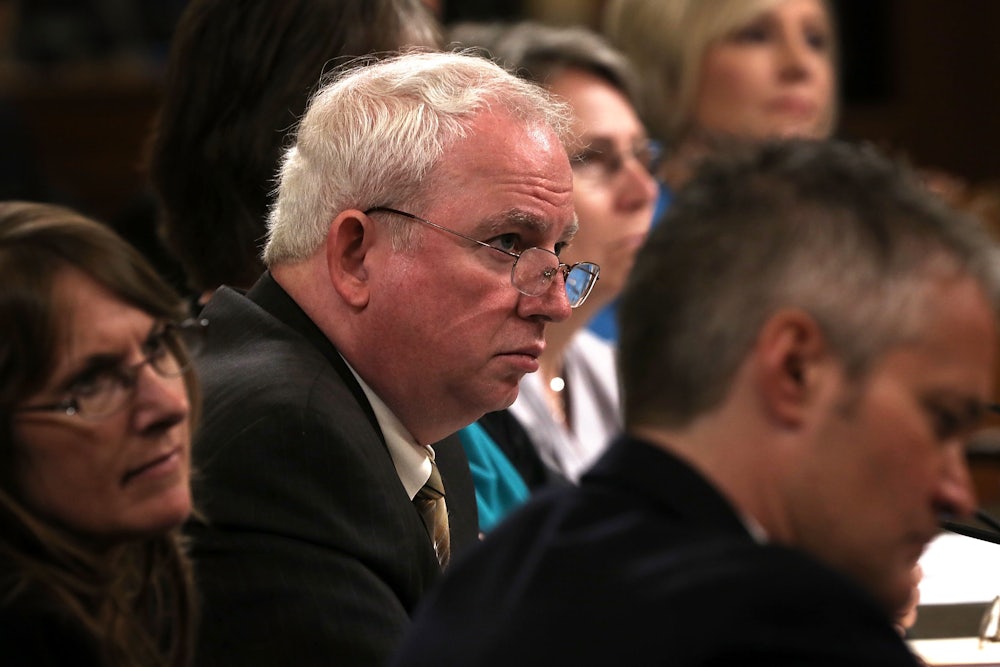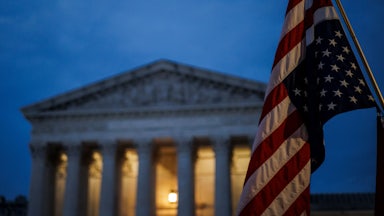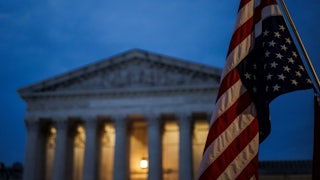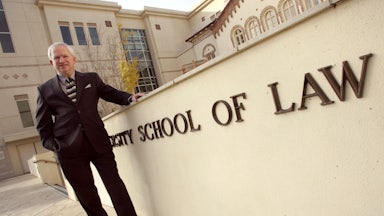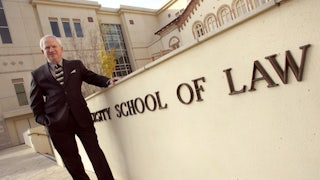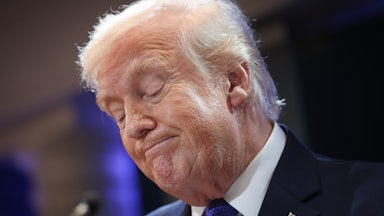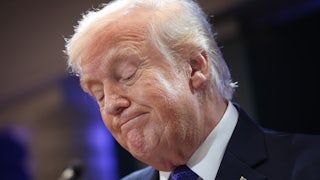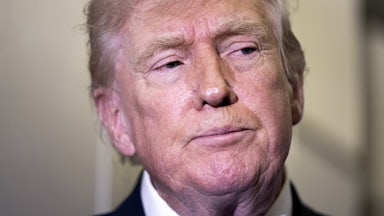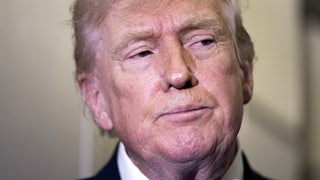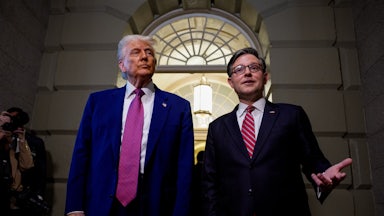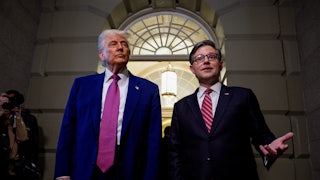Few cases will be as closely watched during the Supreme Court’s upcoming term as Moore v. Harper, the dispute that offers the justices an opportunity to weigh in on what’s known as the independent state legislature, or ISL, theory, which would raise the risk of electoral mischief in Republican-led states. The election clause in Article I of the Constitution says that “the times, places and manner of holding [congressional] elections shall be prescribed in each state by the legislature thereof,” unless Congress overrides them. States have typically worked under the assumption that this clause gives state legislatures the power to pass election laws just as they would pass criminal laws, health and safety laws, and the like.
According to the proponents of ISL theory, however, everyone has been doing the Constitution wrong. They assert that the power given to state legislatures allows them to pass some kind of superlaw that can’t be vetoed by state governors, reviewed by state courts, or bounded by state constitutions. This interpretation has been widely criticized. But with the Supreme Court’s conservatives holding a majority and a penchant for Calvinball, it might still earn five or six votes—and multiple conservative justices have expressed an interest in ISL theory, if not support for it outright.
Proponents of ISL theory had a chance to push back on their critics earlier this month when they filed a series of friend of the court briefs in Moore v. Harper. The case centers around a clash between North Carolina’s Supreme Court and legislature; the former struck down congressional maps drawn by the latter after the 2020 census on anti-gerrymandering grounds, using a provision in the state constitution. North Carolina legislators asked the Supreme Court to intervene earlier this year. In the legislators’ briefs and the friend of the court briefs, the ISL theory’s proponents mostly tried to defend it from its critics. But there was one among them who didn’t care what its critics had to say: John Eastman, the lawyer at the center of former President Donald Trump’s effort to overturn the 2020 election during the lame-duck period.
The legislators argued that the matter is really pretty straightforward: The Elections Clause says “state legislatures,” so the Framers chose to give state legislators the power to draw legislative districts and write election laws unencumbered by state courts and state constitutions. As I’ve noted before, the Supreme Court has ruled otherwise as recently as 2015, and North Carolina’s own statutes allow for judicial review. The lawmakers quoted liberally from concurring and dissenting opinions by conservative justices who disagreed with that ruling or expressed some sort of openness to ISL theory in general.
“The constitutional text thus directly answers the question of which organ, within a State’s government, is authorized to regulate the time, place, and manner of congressional elections: ‘the Legislature thereof,’” they wrote, before quoting a concurring opinion by Justice Neil Gorsuch in a 2020 election case involving Wisconsin. “‘The Constitution provides that state legislatures—not federal judges, not state judges, not state governors, not other state officials—bear primary responsibility for setting election rules.’”
When it comes to originalist views on the matter, the lawmakers conceded that a few early state constitutions imposed limits on state laws for federal elections. Instead of treating this as evidence that it was not unthinkable during the founding era, they argued that these laws’ existence leads them to the opposite conclusion. “The three aberrant state provisions during this period that did purport to limit the legislature’s Elections Clause power, in Delaware (1792), Maryland (1810), and Virginia (1830), are at most historical outliers that are incapable of overcoming the preponderance of historical evidence—not to mention the Elections Clause’s plain text,” the legislators claimed.
The opposing side’s deadline to file briefs isn’t for another few weeks, so for now, the Supreme Court only has half of the case in front of it. One group, however, filed an unusual brief that formally claimed not to take either side but largely disagreed with the state legislators. The Conference of Chief Justices, which represents the chief justices of state supreme courts across the country, told the Supreme Court that the Elections Clause does not exclude state courts and constitutions.
“Many state constitutions from the Founding era contained provisions regulating elections,” the group noted. “This historical context strongly supports state court review of state election laws under state constitutions. And while the text of the Elections Clause requires that state legislatures prescribe the laws governing federal elections, it does not otherwise displace the States’ established authority to determine the final content of their election laws, including through normal judicial review for constitutionality.”
Friend of the court briefs took an even broader view of the matter. Whereas the legislators focused squarely on the case itself before them, a brief filed by the Republican National Committee and other party organizations took aim at the broader discourse surrounding the case. They dismissed the ISL theory’s critics, whether they be constitutional law professors or legal analysts, as hyperbolic and disingenuous.
“By redundantly bellowing the ‘independent state legislature’ mantra, many self-anointed constitutional law experts have convinced a healthy cross-section of armchair Court watchers that, should the Court decide this case the wrong way, it would signal the end of democracy,” they wrote. “Nonsense. Any modicum of honest scrutiny reveals that framing this case in that way transforms the question presented from one about the proper responsibilities for the organs of state government to a cynical, pejorative smear.” (I do not own an armchair.)
One of the principal concerns raised by the ISL theory’s critics is that a state legislature could assign slates of presidential electors to a candidate who did not win the most votes. While this case only deals with the clause for congressional elections in Article I, there is a similar one for presidential elections in Article II. The RNC, to its credit, tried to distance itself from that interpretation of the Constitution.
“[The clause] has never been understood as ‘a source of power to dictate electoral outcomes, to favor or disfavor a class of candidates, or to evade important constitutional restraints,’” it wrote, quoting a concurring opinion by then-Justice Anthony Kennedy in an earlier case. “Properly understood, the Elections Clause includes sufficient restraints to prevent a rogue state legislature from ever causing the hypothetical and fanciful mayhem posited by the critics of Petitioners’ case.”
This would be more reassuring but for another friend of the court filing. Perhaps the most audacious brief came from the Claremont Institute’s Center for Constitutional Jurisprudence—not simply because of the arguments it advanced, but because it was signed by Eastman, who helped precipitate the January 6, 2021, crisis as a legal adviser to former President Donald Trump. After the 2020 election, Eastman floated dubious legal theories about the Electoral Count Act of 1887 to propose a situation where then–Vice President Mike Pence could either personally declare Trump’s reelection by fiat or allow state legislatures to submit new electors based on false claims of electoral fraud. He persisted in these efforts even after a Trump-incited mob stormed the Capitol on that fateful day.
A more repentant man might resist weighing in on major election-law issues so soon after trying to overthrow the republic on behalf of a Manhattan-based landlord. But Eastman is apparently undeterred by the failure of his last campaign against American democracy. As with his January 6 memos, his latest brief did not pretend to draw upon existing statutes or case law to make his argument. He instead laid out all the Supreme Court precedents that cut against his case, and declared how the justices should simply overturn or throw them out to enact his preferred constitutional vision.
In the case Smiley v. Holm, for example, the Supreme Court concluded that “the exercise of the [Elections Clause] authority [by state lawmakers] must be in accordance with the method which the state has prescribed for legislative enactments.” Other provisions that single out state legislatures in the Constitution ask it to do nonlegislative things like elect senators or ratify constitutional amendments, the Smiley court noted, but the Elections Clause asks state legislatures to do something that falls within the sphere of normal lawmaking activity. Eastman dismissed this precedent as “erroneous” and “inapplicable” because the clause did not include the phrase “by law,” even though the court had inferred it from the surrounding text and structure.
An even more recent case in 2015, Arizona Independent Redistricting Commission v. Arizona State Legislature, held that the Elections Clause authority for state legislatures isn’t plenary in nature and instead works through the channels and processes laid out by state constitutions. Eastman barely acknowledged that the Supreme Court’s precedents cut against him here; instead he quoted liberally from Chief Justice John Roberts’s dissent in that case, as if that were the actual law of the land. (In fairness to Eastman, this is a common theme among conservative legal filings in recent years.)
He is even less charitable toward countervailing opinions. “Following the contested 2020 election, a number of legal commentators have denigrated this constitutional assignment of authority to the ‘Legislatures’ of the states as a ‘novel,’ ‘unprecedented,’ ‘fringe,’ even ‘unconstitutional’ ‘independent state legislature theory,’” he said, before listing law review articles by some of the nation’s most respected constitutional law scholars. Eastman derided their reading of the Election Clause as a “policy preference.” What an amusing dismissal from someone who argued that the Constitution and the Electoral Count Act allow vice presidents to unilaterally decide presidential elections.
All is not lost if the Supreme Court embraces these briefs’ reasoning. If the Supreme Court makes it impossible for Americans to stop gerrymandering by doing anything other than begging the gerrymanderers to stop doing it, then Congress could simply abolish single-member House districts and end corrupt redistricting practices forever. Proportional representation, which could be mandated by federal law, would make every vote count in every state for House representation. And the Elections Clause is crystal clear: State legislatures can only act in cases where Congress itself has not done so. Not even John Eastman can argue that one away.
